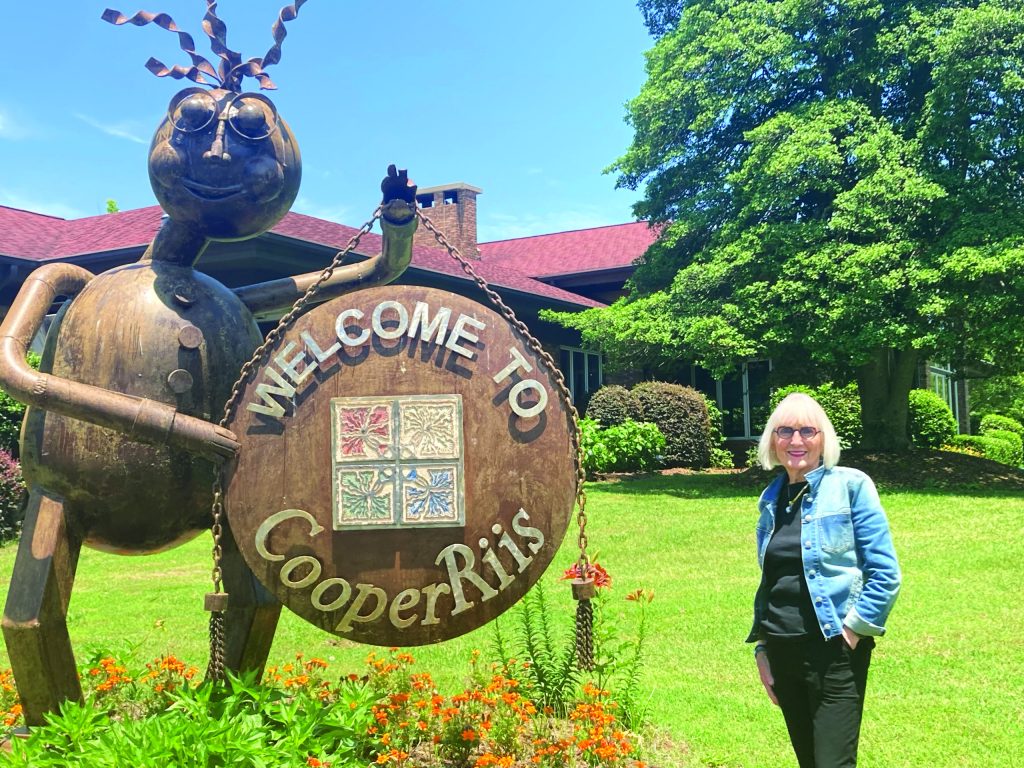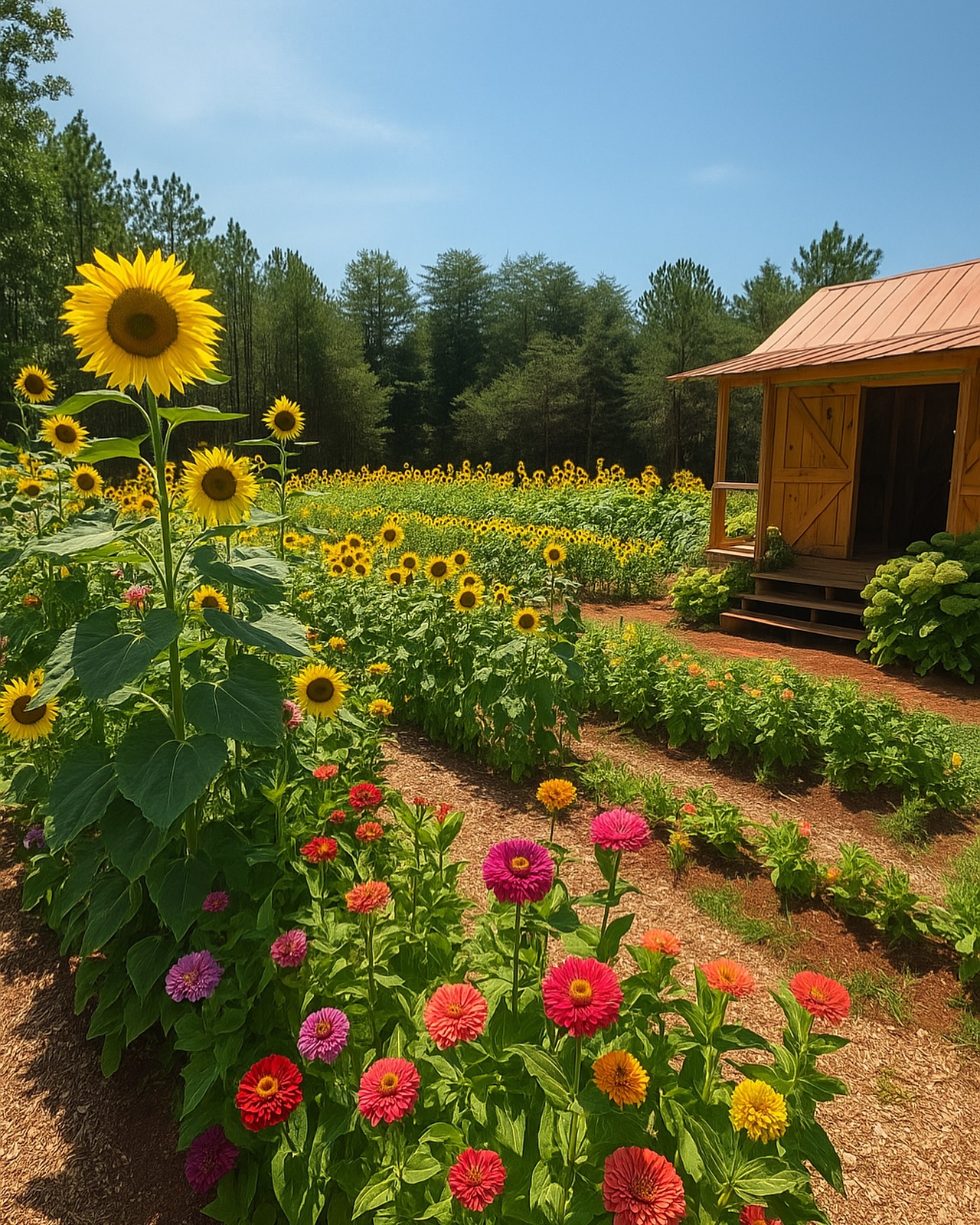Life in our Foothills July 2024 – Building a Place with Purpose – Lisbeth Cooper
Published 1:55 pm Thursday, July 11, 2024

- Lisbeth Cooper stands by the statue known as “the Curly Man” at the entrance of CooperRiis.
|
Getting your Trinity Audio player ready...
|
In a conversation with Lisbeth Riis Cooper, the word purpose comes up more than almost any other. It’s a word heard often around the 94-acre working farm in Mill Spring that makes up CooperRiis, a non-profit residential healing community for adults with mental health challenges. Lisbeth founded with her husband, Don Cooper, in 2003.
CooperRiis is a place with purpose, born of Lisbeth’s personal experience caring for a loved one.
“I spent ten years looking for mental health care for a family member,” Lisbeth says. “And it was just a circle of hospitals and group homes. After a decade, I did not see any progress because it was just the same cycle over and over. With one exception, when they spent six months at a therapeutic farm. I started seeing a change. And I said there has got to be something to what they are doing. A few years later, we had another bad cycle, and I threw up my hands and told my husband we needed to start a therapeutic farm.”
Trending
Originally from Denmark, Lisbeth, a graduate of the Fashion Institute of Technology and fashion industry veteran, had the idea. Still, she knew she needed her husband to make it a reality. And while Don, who she gives all the credit for making the non-profit successful thanks to his business background, was reticent at first, he eventually came to see Lisbeth’s commitment to the idea, and the two began turning an old-horse farm off Hwy. 108 into the beautifully manicured campus and working farm CooperRiis has become today. And while the Coopers did not know much about mental health when they started, they relied on their own experiences. Lisbeth knew what the purpose of the place should be from seeing what didn’t work.
“Let’s build a place where people can truly heal,” Lisbeth says of the initial idea.“For starters, we will do person-centered care, where everyone has a recovery plan that works for them. So when a person comes in, we ask them what their dream is, what they hope to achieve while they’re here, and what their goals are. They then write down their goals, which becomes their recovery prescription. And the therapist, the nutritionist, and everybody in the community knows their goals, giving it a team approach, and every person has their team around them.”
The campus has various spaces showcasing teamwork, such as the wood shop, art barn, greenhouses, and gardens. Animals such as ducks, pigs, sheep, and even a few dogs and cats are taken care of in a team manner, and CooperRiis earns its title as a working farm growing food used in the dining hall kitchen, which has adopted the Mediterranean diet.
While Lisbeth credits CooperRiis’s success mainly to its staff, CEO Eric Levine, and her husband, her fingerprints are to be found throughout. She handpicked the chairs to make sure they rocked or moved because it was shown to be soothing. The carpets and colors throughout the buildings and lodges where residents stay all benefit from her background in fashion.
After leaving the farm, some residents move to housing owned or overseen by CooperRiis in the larger community, where they receive varied staff support and independence.
They also have a campus in Asheville, with Asheville Mayor Esther E. Manheimer recently announcing May 20, 2024, CooperRiis Mental Health Awareness Day. This proclamation coincided with Mental Health Awareness Month, promoting the city’s commitment to mental health advocacy.
Trending
Since its launch in 2003, CooperRiis has supported nearly 2,000 individuals. It is committed to personalized care with the help of a supportive community. Short- and long-term residential mental health programs provide a continuum of care for adults 18 years or above, of all backgrounds and identities, at different stages of the recovery journey.
In a world where mental health treatment continues to evolve, CooperRiis stands out with its unique approach. The inclusion of a job program, frequent psychotherapy sessions, and a dedicated addictions counselor sets this center apart from other options, emphasizing its commitment to helping individuals achieve a productive and fulfilling life. As North Carolina grapples with challenges in its mental health system, programs like CooperRiis offer a beacon of hope for those in need. Inspired by the model established at Gould Farm in Massachusetts in 1913, the Polk County center remains a rare gem, being the sole community of its kind in the Southeast and one of just a dozen nationwide.
Structure, nutrition, work, coping skills, and exercise are some of the tools those who come through CooperRiis leave with—a toolbox that will help them succeed in achieving their future goals that were set during their stay. Many who have witnessed the program call it the nation’s best treatment and recovery model.
One of the main reasons for this is Lisbeth’s own experiences and the Coopers’ willingness to accept ideas from staff and residents. It is also clear that, as a mother and grandmother, she wants residents to be treated and cared for like they were members of her own family so that when they leave CooperRiis, they can accomplish their goals and fulfill their purpose.
“We’ve put a lot of emphasis since day one on family education. We do online sessions once a week or every other week with the family member, resident, and therapist talking together,” Lisbeth says. “For example, in my own situation, I learned and understood how to deal with a family member in crisis by learning to stay calm, validate their emotions, bring them down to another level, and then have a conversation start.
“Recovery is not linear. It goes in waves just like life.”





